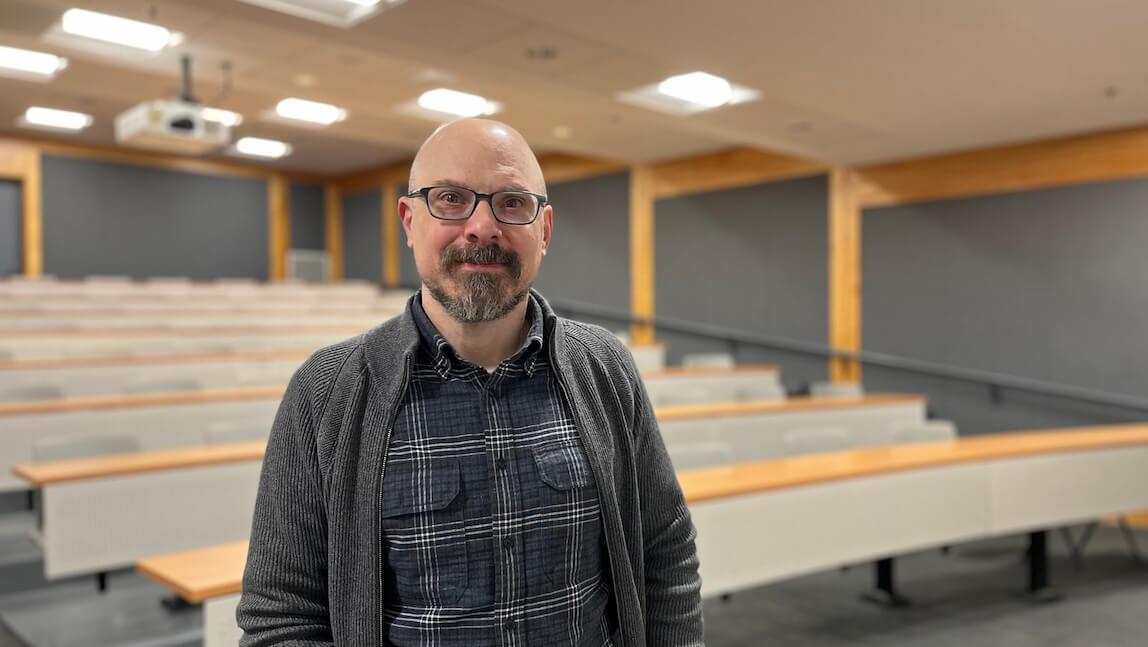Ryan G. Kriger, J.D., lecturer in the Department of Community Development and Applied Economics, was the 2023 winner for the Outstanding Part-Time Faculty Teaching Award. The award, presented annually, honors and recognizes the teaching contributions of part-time United Academics Represented faculty. Kriger, a consumer protection attorney for the Federal Trade Commission, teaches classes on privacy law, consumer protection, and public policy within the department of Community Development and Applied Economics.
Even with such a busy schedule, Kriger graciously agreed to be interviewed about career highlights and how students can take effective action for change in their community.
You work in a very specific area of law. Help us understand (in superhero term’s) your origin story:
I heard once that some of the best lawyers are angry about something. When I went to law school, I asked myself what made me really mad. I thought about the giant insurance company that my dad worked for, who laid him off after 30 years, after he was called up from the Navy reserves and fought in the first Gulf War. I thought about my first job out of college, working in a leadership trainee program where a lecturer told us that the goal of the company was “increasing shareholder value,” aka keeping their stock price up. Not making good products. Not being responsive to their customers. Not innovating. Keeping the stock price up.
Most of the businesspeople I’ve met over the years are honest, hardworking, and want to do right by their customers. They’re proud of the businesses they built and believe that trust and fair dealing are essential to running a successful business. That’s why it makes me so mad to see some giant corporations, who often acquire or drive their smaller competitors out of business, treating their own customers with such undisguised contempt.
The unfortunate fact is that an unregulated marketplace tends to benefit companies who want to act underhanded, to the detriment of the honest merchants and the public. That’s why I do what I do, because seeing people get away with unscrupulous tactics just makes me angry.
When we’re little kids, we say things like “that’s not fair!” and “you have to tell the truth!” As we get older, our beliefs become more nuanced, we learn that life isn’t always fair, and maybe there’s no such thing as a single understood “truth.” I like to joke that I never really got past the black-and-white thinking of youth. Vermont’s Consumer Protection Act and the Federal Trade Commission Act each say, “Unfair and deceptive acts and practices in commerce are illegal.”
That’s it. Don’t be unfair. Don’t be deceptive. That’s the law that I enforce. And it feels good.
What professional moment are you most proud of?
There have been a lot of moments over my time teaching and in the AG’s office that I’m proud of. The biggest one was probably my work in getting Vermont’s Data Broker Registry passed. Data Brokers are companies that collect vast amounts of information about us and sell it. It is a mostly unregulated area. There has historically been little stopping data brokers from selling sensitive information about us to scammers or unscrupulous businesses.
In 2017, Vermont became the first state in the nation to pass a law specifically targeting data brokers. It didn’t require a lot, only that data brokers doing business in Vermont register annually so that people could know who is collecting their personal information. Basically, we wanted to introduce some sunlight into the industry. But to see the amount of lobbying muscle that industry threw at stopping this bill, you’d think we were trying to ban the industry entirely. I observed at the time that this is the only industry I’ve ever heard of where the participants don’t want anyone to know they exist. Most companies spend a lot of money to get people to know who they are. This industry, which profits by invading everyone’s privacy, was extremely secretive about their own activities.
Although I was proud of that accomplishment, I didn’t think that law, standing alone, would move the needle for consumer protection that much, but hoped that other states would follow Vermont’s lead. A year or so later, California passed its own Data Broker Registry, modeled on Vermont’s. And just a few months ago California’s governor signed into law the Delete Act. This law will create a mechanism that allows any California resident to go online and, with a single act, request that every data broker on their registry delete the consumer’s information.
I now understand that that’s why all those lobbyists were descending on Montpelier to kill the Data Broker bill. It would lead to the thing they most feared: consumers’ regaining control of their information.
What are ways that young people can take effective action for change in the community?
First and foremost, people have to adopt an attitude of change. You may look around and see tons of problems, and it’s easy to shrug and think “that’s just the way it is.” But anything and everything can change, nothing is non-negotiable. So look around and think about what problems need solving, then find an organization that’s working to solve the problem. It might have suggested actions on their website, or you can contact them and offer to volunteer. If you don’t see a solution out there that works for you, get creative. Brainstorm solutions, contact your representative, write a letter to the editor or an op-ed, post videos online, educate yourself about the issues.
One thing to remember is that change is almost always a group effort, and sometimes things move slowly. You might not see real change happen soon, but that doesn’t mean your effort is wasted. It takes many people pushing together to eventually make change happen, but it does happen.
